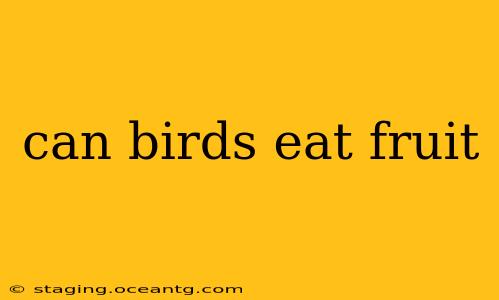Can Birds Eat Fruit? A Feathered Feast of Facts
Many bird species enjoy a fruit-based diet, supplementing or even primarily relying on this nutritious food source. However, the answer to "Can birds eat fruit?" isn't a simple yes or no. It depends on the type of bird and the type of fruit. While some fruits are beneficial additions to a bird's diet, others can be harmful or even fatal. Let's delve into the details.
What Types of Fruit Can Birds Eat?
A wide variety of fruits are safe and even beneficial for many birds. These include:
- Berries: These are a staple for many species, offering a rich source of vitamins and antioxidants. Examples include blueberries, raspberries, strawberries, cranberries, and elderberries.
- Soft Fruits: Fruits like bananas, melon (cantaloupe, watermelon), and grapes (in moderation) are often enjoyed by birds, providing carbohydrates and essential nutrients.
- Apples & Pears: Slices of apples and pears (remove seeds and cores) can be a healthy treat. Be sure to cut them into manageable sizes for smaller birds.
It's crucial to remember that fresh fruit is always the best option. Avoid fruits that have been treated with pesticides or preservatives.
What Fruits Should Birds Avoid?
Some fruits present risks to birds:
- Avocado: Contains persin, a toxin that can be harmful to birds. Avoid feeding avocados to your feathered friends.
- Citrus Fruits: While some birds might nibble on a small amount, large quantities of citrus fruits (oranges, lemons, limes) can upset their digestive system.
- Stone Fruits (Cherries, Plums, Peaches): The pits of these fruits contain cyanide compounds which are toxic. Remove the pits before offering these fruits to birds.
- Overripe or Rotten Fruit: Spoiled fruit can harbor harmful bacteria and molds, leading to illness. Always use fresh, ripe fruit.
Are All Birds Fruit Eaters?
No, not all birds are fruit eaters. Many birds are insectivores (eating insects), carnivores (eating meat), or granivores (eating seeds). Their dietary preferences are determined by their beak shape, digestive system, and natural foraging behavior. Fruit-eating birds often have beaks adapted for piercing fruit skins or accessing nectar.
What are the Benefits of Fruit in a Bird's Diet?
Fruits provide several nutritional benefits for birds:
- Energy: Fruits are a great source of natural sugars, providing birds with energy for flight and other activities.
- Vitamins and Minerals: Many fruits contain essential vitamins and minerals necessary for maintaining a healthy immune system and overall wellbeing.
- Antioxidants: Certain fruits are rich in antioxidants, which help protect against cell damage.
How Much Fruit Should I Feed Birds?
Fruit should be offered as a supplemental treat, not a staple in a bird's diet. Overfeeding fruit can lead to digestive upset and nutritional imbalances. A small amount, a few times a week, is generally sufficient. Observe your bird's behavior and adjust accordingly. If you are unsure about the best diet for your bird, consult an avian veterinarian.
Can I Feed My Pet Bird Fruit?
If you have a pet bird, it's essential to research the specific dietary needs of your species. Some pet birds may tolerate small amounts of specific fruits, while others should avoid them entirely. Your avian veterinarian is the best resource for creating a balanced and healthy diet plan for your pet bird. Always prioritize a balanced diet consisting of species-appropriate pellets, seeds, vegetables, and occasional treats, rather than relying solely on fruit.
By understanding which fruits are safe and appropriate for various bird species, we can better appreciate the diverse diets of these amazing creatures. Remember responsible feeding is key to promoting the health and wellbeing of wild and captive birds.
